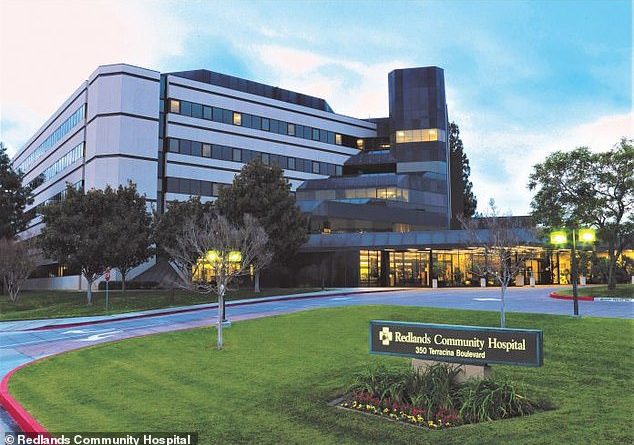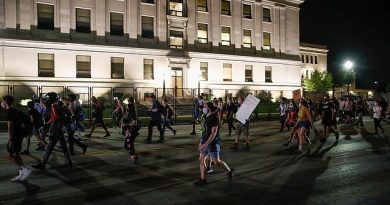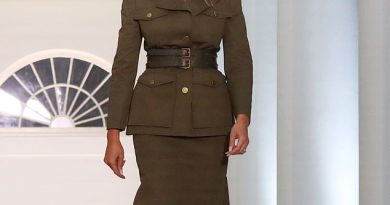California medical staff gave COVID-19 vaccines to RELATIVES instead of healthcare workers
At least two hospitals in Southern California have been found to be vaccinating the relatives of employees working at the facilities, many of whom are not involved in healthcare whatsoever.
Redlands Community Hospital in Culver City said it was left with ‘extra’ doses of the Pfizer/BioNTech vaccine and so reached out to people who didn’t work at the medical center.
The hospital claims that the vaccine doses would have otherwise expired and insists that all first-responders working at the 420-bed facility were treated first.
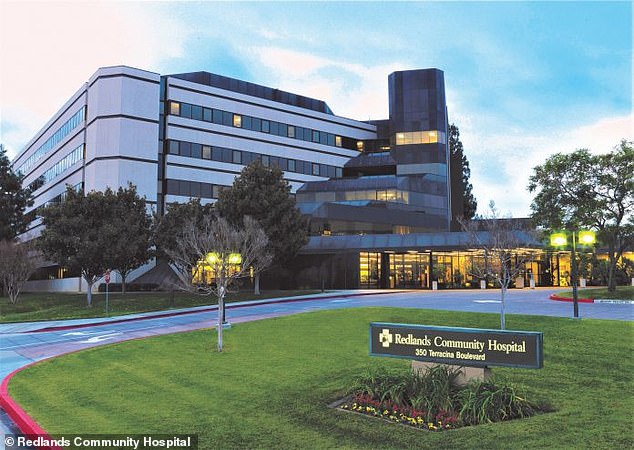
At least two hospitals in Southern California have been vaccinating non-frontline workers having received ‘extra’ doses of the Pfizer/BioNTech vaccine including Redlands Community Hospital
A relative who works at Southern California Hospital, but did not want to be identified, also said that family members were invited to receive Pfizer vaccines.
‘The hospital had planned on vaccinating all of their employees, but a large number of their staff declined and they were sitting on a lot of thawed vaccines,’ the woman said to the Orange County Register.
‘They offered police officers, firefighters and first-responders to get vaccinated and also told employees they could invite four family members.’
She will return to the hospital in a few weeks time to receive a second dose of the vaccine.
But despite attempting to keep the extra inoculations to family members, the hospital quickly became overwhelmed by those clamoring for the extra Pfizer doses.
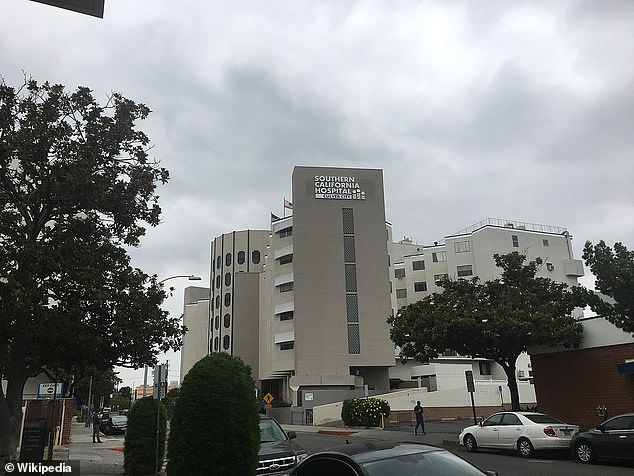
A relative of a worker from Southern California Hospital say they were also ‘invited’ to receive the vaccine
The hospital was forced to stop offering vaccines to relatives and go back to focusing on solely first-responders.
However, the vaccination program outlined in federal guidelines, put together by the Centers for Disease Control, said relatives should be treated far later in the rollout of the vaccine.
It has seen some hospital boards come out to state openly that they are following the rules to the letter.
‘We have been really holding the line and making sure frontline workers go first,’ said Krist Azizian, chief pharmacy officer for Keck Medicine of USC, which has about 9,000 workers to the OC Register. ‘We do not offer it to family members of our staff.’
Any extra, the hospital says, goes to frontline workers.
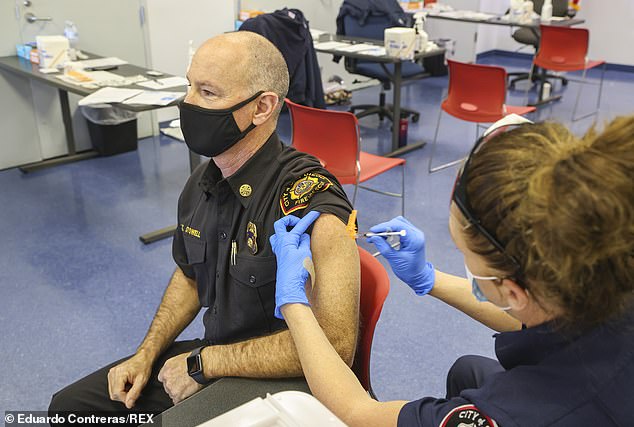
Engineer/paramedic Bonnie Breckenridge (right), gives the the Pfizer COVID-19 vaccine to Fire Chief Colin Stowell (left) at the San Diego Fire-Rescue Training Facility
The main issue with the Pfizer vaccine is that it must be stored at a temperature of -94 degrees Fahrenheit and as soon as it is taken out of the freezer, must be administered as soon as possible, or it goes to waste.
The woman who got to receive the vaccine early despite not being a frontline worker has praised the actions of the hospital in seeing that none of it goes to waste.
‘Faced with thawed, expiring vaccines that can’t be refrozen, and no contingency plan, doctors made the choice to vaccinate people they could,’ she said.
‘That’s what doctors do, save lives. That’s what happens in disasters. Situations are constantly in flux and people have to make command decisions to save as many lives as possible within their current capacity. Hospitals are overwhelmed saving lives and don’t have time to stop and create a new vaccine distribution plan for a small amount of vaccine that is about to expire.’
Southern California Hospital has denied that relatives of employees were invited to to receive the Pfizer vaccine.
Andrew Noymer, an associate professor of public health at UC Irvine says it appears Southern California Hospital handled the situation properly,
‘That seems like a reasonable explanation, if they truly received more vaccinations than they can use, it’s not really their fault,’ he said.
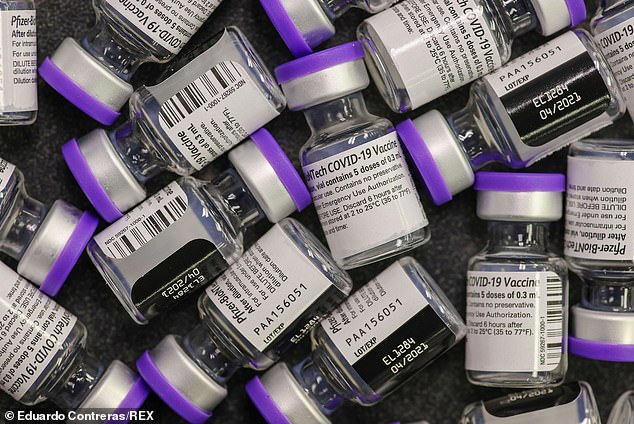
The main issue with the Pfizer vaccine is that it must be stored at a temperature of -94 degrees Fahrenheit and as soon as it is taken out of the freezer, must be administered as soon as possible, or it goes to waste. The extra doses were offered to others in order all of it be used
‘The excess could not be returned to the distribution center,’ the hospital explained in an email.
‘Instructions provided with the vaccine indicated that the vaccine has a shelf life of five days when removed from the approved freezer. The distribution center indicated the vaccine was not to be stored in dry ice or transport freezers. All the vaccine had to be used within five days or go to waste,’ spokeswoman Laura Gilbert said.
‘After inoculating all hospital employees who requested the vaccine, staff contacted physicians who treat patients at the facility, as well as local first-responders, including police officers, firefighters, and emergency medical technicians to inform them of the vaccine’s availability. Additionally, some public service workers were also vaccinated.
‘This decisive action ensured we achieved our goal of vaccinating all frontline staff as quickly as possible, and prevented the waste of valuable vaccine,’ Gilbert said.
‘They don’t exactly deny that staff family members were vaccinated, only that they weren’t invited,’ said Dr. David D. Lo, senior associate dean of research at the UC Riverside School of Medicine. ‘Also, it gave no indication that they had actually planned out their vaccination strategy.’
Back at the Redlands Community Hospital a 33-year-old claims to have been vaccinated after her husband’s aunt, who works at the facility, had some extra doses that were set to expire.
‘Science is basically my religion, so this was a big deal for me,’ the woman said in a Facebook post.
Redlands Community say that the non-frontline healthcare workers were offered the vaccine because the hospital had extra doses and wanted to ensure the vaccine wasn’t thrown away.
The woman was not a healthcare worker either and is normally employed by Disney.
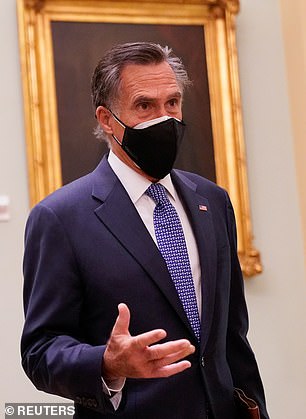
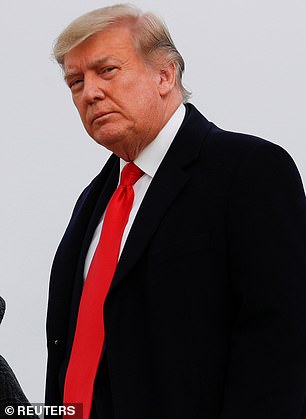
President Trump on Friday defended his administration’s ‘successful’ distribution of COVID-19 vaccines and blamed the states for the slow rollout after Senator Mitt Romney urged the federal government to develop a comprehensive plan for
Meanwhile, President Donald Trump has blamed the slow rollout of the COVID-19 vaccines on the states as he praised his administration’s ‘successful’ distribution of the doses amid growing backlash over the disastrous program.
Trump appeared to respond to mounting criticism of the vaccine rollout on Friday after new data revealed only a quarter of the shots distributed to states have been administered since early December.
As of New Year’s Day, 3.17million doses of the Pfizer and Moderna vaccines have been administered. That is just 25 per cent of the 12.4million doses that have been delivered to states, according to an analysis from Bloomberg.
Trump however has defended his administration’s efforts, saying it’s the states that are moving at a slow pace when it comes to vaccinating the population.
‘Some States are very slow to inoculate recipients despite successful and very large scale distribution of vaccines by the Federal Government. They will get it done!’ Trump said on Twitter.
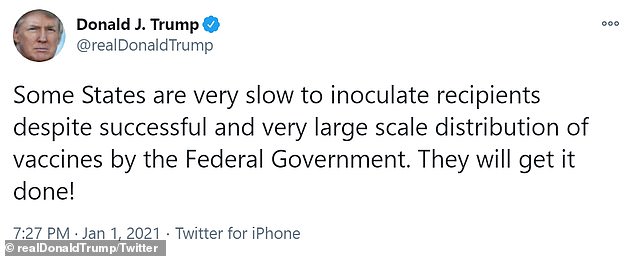
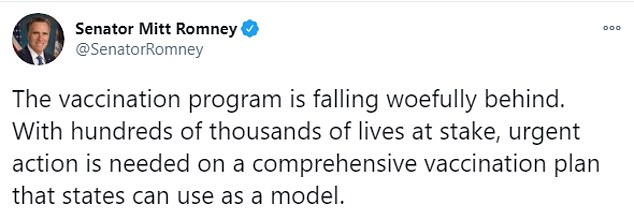
The tweet appeared to be in response to Senator Mitt Romney and President-elect Joe Biden, who both spoke out in harsh terms about the clumsy effort to distribute vaccines hours earlier.
In an emotional statement released on Friday, Romney, a Republican but frequent Trump critic, warned the delays would be ‘deadly’ if the government does not urgently undertake new strategies to boost vaccination efforts.
‘That comprehensive vaccination plans have not been developed at the federal level and sent to the states as models is as incomprehensible as it is inexcusable,’ Romney said in a statement that was perhaps aimed as much at the incoming B
iden administration as the outgoing Trump one.
‘It was unrealistic to assume that the health care workers already overburdened with Covid care could take on a massive vaccination program,’ Romney said.
The senator also highlighted the fact that the program is ‘woefully behind’ despite it only targeting frontline workers and long-term care residents – the ‘two easiest populations to vaccinate’.
He called on the government to ‘enlist every medical professional, retired or active, who is not currently engaged in the delivery of care’ to be drafted into a crash program of government-run vaccination sites across the country.
‘This could include veterinarians, combat medics and corpsmen, medical students, EMS professionals, first responders, and many others who could be easily trained to administer vaccines,’ he proposed.
Romney also proposed a scheme to ‘Schedule vaccinations according to a person’s priority category and birthdate: e.g., people in group A with a January first birthday would be assigned a specific day to receive their vaccination.’
Referring to his experience overseeing the Salt Lake City Winter Olympics, Romney also included what could be seen as a pitch to the Biden administration to offer his own assistance, saying: ‘I have experience organizing a major logistical event,’ though adding humbly that it was ‘nothing on the scale of what is called for today.’
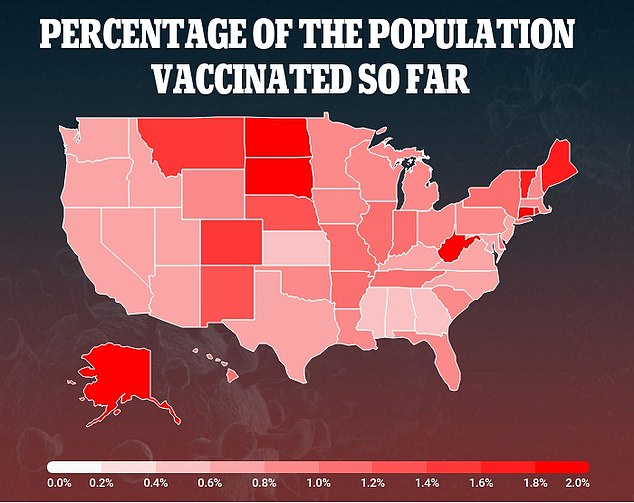
As of Friday, West Virginia has still vaccinated the highest percentage of its population, followed by South Dakota and Maine. Kansas continues to lag the farthest behind in population vaccinated, with just 0.42% of all residents having received the jab
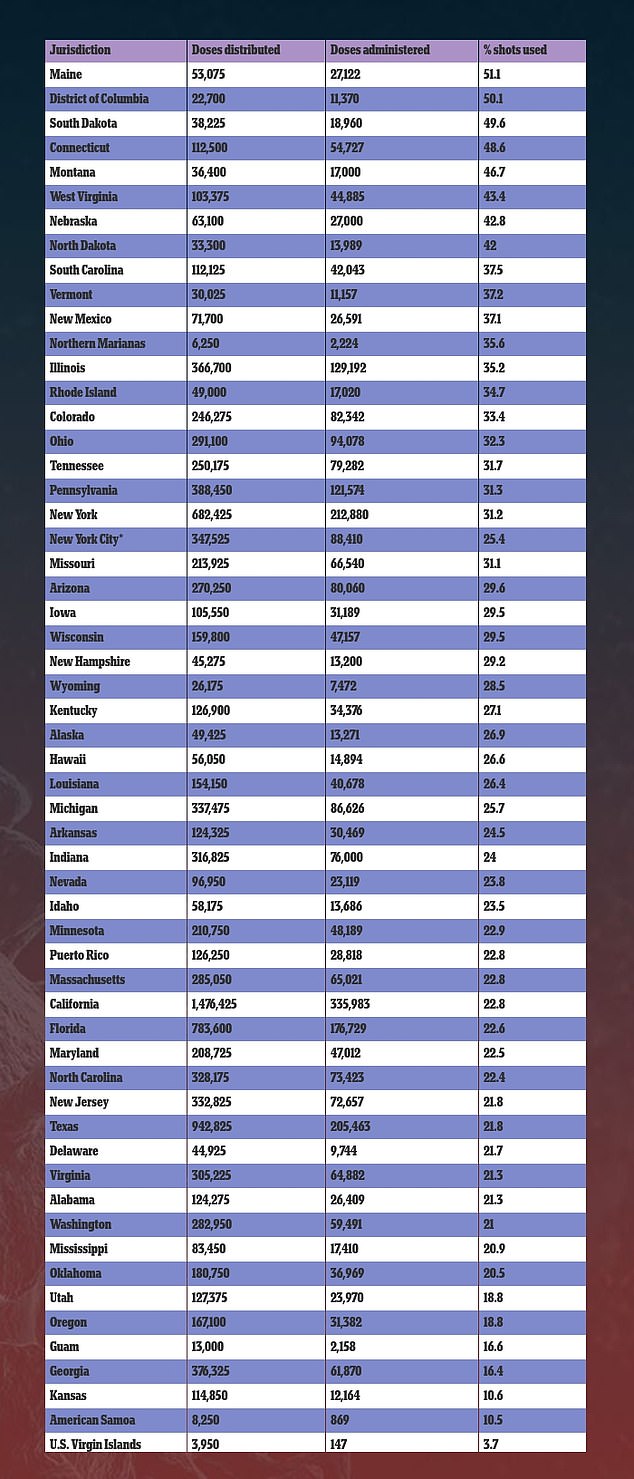
A table shows for each state, vaccine doses received and administered, and the percentage of shots used. Maine has now distributed the highest percentage of its available vaccine, with more than 50% of doses administered

